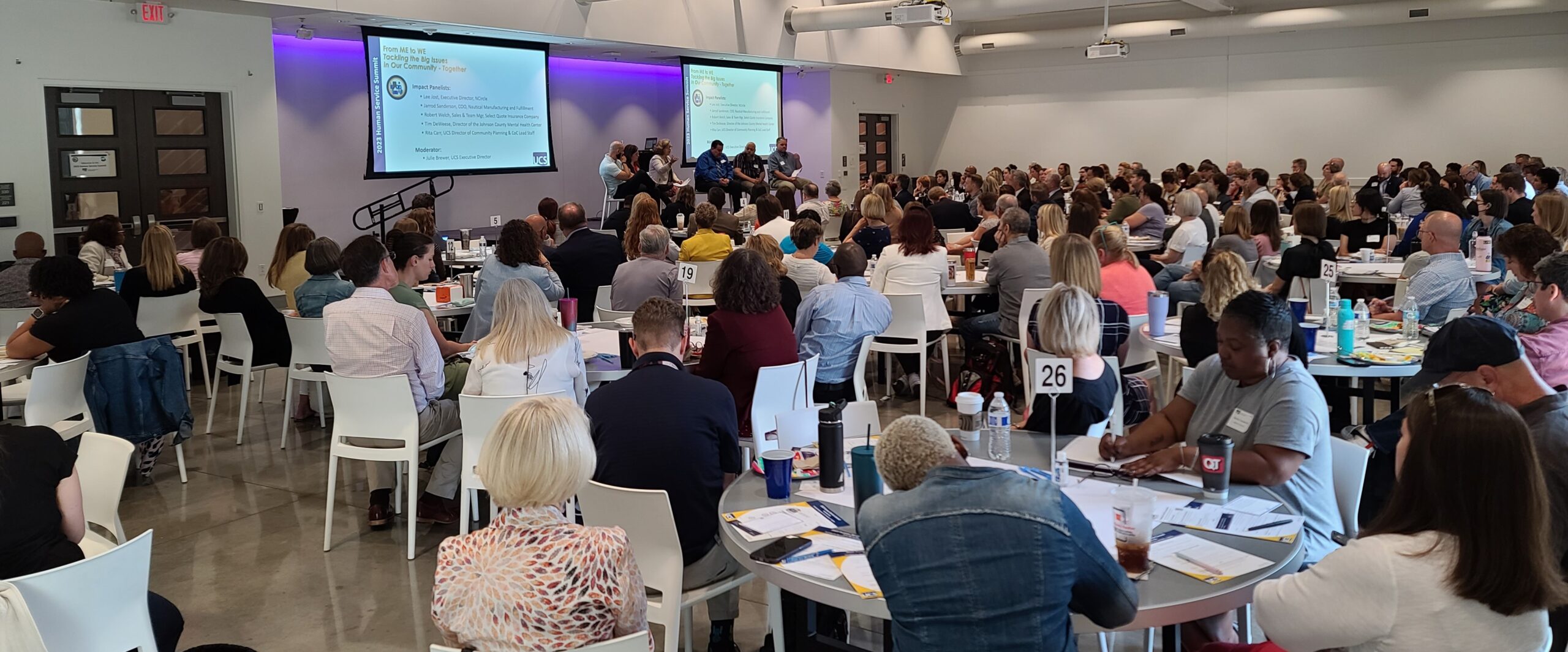
Approximately 200 attendees came together for the UCS 2023 Human Service Summit, where the theme of the day was “From Me to We: Tackling the Big Issues Together.” The big issue that participants focused on was establishing a shelter for our unhoused community members, and how each participant could play a role in helping establish a continuum of housing within Johnson County. Two panel discussions framed both the impact of housing challenges and homelessness in our community, as well as visions for possible solutions. One solution highlighted during the Summit is the Dignity Project, which aims to address the needs of those experiencing homelessness, including creating a year-round non-congregate shelter. The Dignity project engaged iBossWell to implement a shelter feasibility study, and Summit participants were presented with some of the initial outcomes of the study. UCS and iBossWell finished the day by listening to Summit participants with table breakout sessions focused on how we can all play a role in supporting and promoting housing solutions.
Julie Brewer, UCS Executive Director, and Kristy Baughman, Director of Education and Planning, kicked off the morning with a brief presentation highlighting how past UCS Human Service Summits led to the 2023 Summit. Summit themes over the past five years have focused on housing, community, and connectedness; during these gatherings, UCS has provided data, shared stories and successes, and invited the community to join in on important initiatives. The presentation ended with a Call to Action: Community advocacy starts with each of us and we each have a role to play and the power to create change.
The first of this year’s two panel discussions focused on the impact of homelessness and housing challenges on our community. Featured panelists included:
- Lee Jost, Executive Director, NCircle
- Jarrod Sanderson, COO, Nautical Manufacturing and Fulfillment
- Robert Welch, Sales & Team Manager, Select Quote Insurance Company
- Tim DeWeese, Director of Johnson County Mental Health Center
- Rita Carr, UCS Director of Community Planning & Johnson County Continuum of Care on Homelessness Lead Staff
Lee Jost highlighted how homelessness in Johnson County is a need that can be met, and that Johnson County is in a unique position to meet that need. As an employer, Jarrod Sanderson reminded Summit participants of the vital need Johnson County has for employees, and that community members who are experiencing homelessness can be an essential economic resource. Rita Carr provided insight and data that described the experiences of unhoused community members, and Tim DeWeese unpacked the “no wrong door” concept of care, emphasizing how vital coordination is in how our community addresses homelessness. Summit participants also heard panelist Robert Welch share his own experience with homelessness that illustrated how vital community services are in helping unhoused community members quickly reestablish stability.
The second panel of the day highlighted creative solutions to homelessness and housing challenges, and included the following panelists:
- Joe Karlin, Co-Founder and Executive Director, Dignity Project
- Lindsay Hicks, President and CEO, Habitat KC
- Heather Bradley-Geary, Director of Supportive Housing, The Vecino Group
- Megan Foreman, Housing Coordinator, Johnson County Government
Kristy Baughman, UCS Director of Education and Planning, moderated the second panel, focusing on what housing solutions can look like and what is needed from the community to reach meaningful solutions. Joe Karlin shared his path to becoming Co-founder and Executive Director of the Dignity Project and spoke about the real potential Johnson County has to meet the needs of those experiencing homelessness in our community. Lindsay Hicks and Heather Bradley-Geary echoed that belief, outlining upcoming projects in Johnson County and existing projects in other communities. Then Megan Foreman highlighted the efforts underway in the County and shared a video that captured some of these efforts. The group also discussed community resistance to these efforts and called on Summit participants to share the message that advocating for those struggling with housing challenges in Johnson County is also advocating for a stronger, more connected community.
Click here to learn more from our panelists.
This year’s breakout session was led by Wayne Powell, President and Chief Executive Officer, and Lynne Brown, Vice President Strategic Planning, for iBossWell, Inc. Wayne and Lynne shared some initial findings from iBossWell’s feasibility study related to establishing a non-congregant shelter for Johnson County’s unhoused community members. With this information and the insights provided by the panel discussions, Summit participants joined table breakout sessions and were asked to answer three questions related to homelessness solutions focusing on barriers, influence, and sustainability:
- Barriers: How do we move community sentiment about shelter and next step housing from being viewed as a burden to a community benefit?
- Participant Feedback: Counter myths and misconceptions by building empathy through storytelling campaigns; Establish platforms to educate the public and decision-makers with facts and data; Get involved through advocacy at city and county meetings, social media, faith groups, and neighborhoods; Communicate the ways in which those experiencing homelessness are a great potential workforce resource.
- Influence: How can you use your influence/personal networks to tell and lift up the stories of residents experiencing homelessness as a call to action?
- Participant Feedback: Develop compelling talking points and be ready to share them (example: Johnson County is an exceptional community and our response to homelessness should be as exceptional as we are); Contact and support local officials who are working in support of this issue; Leverage the reach and influence of faith communities.
- Sustainability: How do we build long-term understanding and support to create a lasting response to homelessness?
- Participant Feedback: Include and involve people impacted by homelessness in messaging and sustainability planning; Put resources into preventing homelessness and establishing stable housing options for those coming out of homelessness; Ensure everyone is at the table, including landlords, residents, decision-makers and stakeholders.

